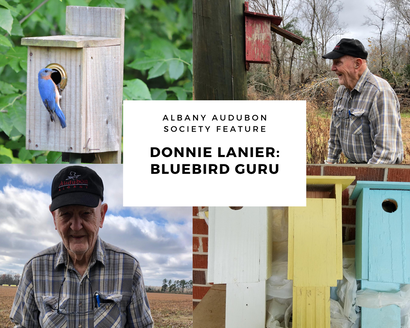 By Kathie Entz, Albany Audubon Society Donnie Lanier, age 90, is Albany Audubon Society’s Bluebird Guru. American Birds magazine placed the Eastern Bluebird second on the Blue List in 1978. Created by National Audubon in 1971, the Blue List was an early warning system for species that were experiencing a reduction in population or range. In response, The Albany Audubon Society founded a bluebird housing project with the ambition of restoring bluebird populations in South Georgia under the initial leadership of Lloyd Kinney. Kinney enlisted the help of Donnie Lanier, and together they installed their first bluebird nesting box in Camp Osborn, a local Boy Scout Camp. The following year they expanded the program, adding additional boxes in Smithville. In the 1980s, Kinney began experiencing some health issues so Donnie took the lead, and he has been spearheading the Eastern Bluebird nesting box project in Albany ever since. The Albany Audubon Society chapter was founded in 1972. Donnie Lanier and his wife, Sylvia, joined the local chapter six years later. Donnie retired from the City of Albany after 32 years as an engineer and Director of Public Works. All three of his children still reside in the Albany area. Renowned Georgia wildlife artist David Lanier is his son. Donnie’s passion for Eastern Bluebird conservation is ongoing. The simple beginnings of adding the first birdhouse has grown from Albany, located in Dougherty County, to surrounding counties. Currently there are more than 500 Albany Audubon Society bluebird nesting boxes along 14 different routes, with 30 to 70 nest boxes along each route! Each year, Donnie uses wood scraps from homes under construction and other donated items, such as paint and nails, to build the boxes for the next season. He estimates boxes need to be replaced every five years and builds 50 to 100 boxes each year to replace old boxes and add new ones. A series of natural disasters in the past 18 months, including two tornadoes and Hurricane Michael, destroyed quite a few boxes, damaged homes, and significantly altered the landscape, making this work even more important. Donnie says that some are even stolen each year. Eastern Bluebirds nest in wide-open areas. Donnie installs the nest boxes at least 500 feet apart and four to seven feet off the ground for optimal results. Eastern Bluebirds are not as picky about the box openings, so Lanier builds some boxes with circular holes and others with a horizontal entrance. According to Lanier, bluebirds will typically build a nest two to three times a year, building each nest on top of the last nest, and lay four to five eggs with each brood. Each year the Albany Audubon Society cleans and maintains the nesting boxes. In the winter months, Society members record data on each box. Information is collected for each box, including the number of nests, unhatched eggs, current occupants, and the physical condition of the nesting box. This data is used for research projects by students from Abraham Baldwin Agricultural College. Eastern Bluebirds compete for nesting boxes with sparrows, flying squirrels, snakes, wasps, ladybugs, and other insects. The nests are easy to identify because bluebirds create “neat nests” using pine straw, whereas a sparrow nest in a bluebird box will appear “junky and unorganized.” Bluebird boxes that are located near south Georgia’s expansive pecan groves are also susceptible to herbicide spray, adding an additional challenge for successful nests. Donnie’s enthusiasm for the bluebird project is contagious and is a family affair. His brother-in-law, Will Smith, has donated wood for the boxes, and Donnie also taught him how to build them. Will has begun a route in Georgetown, Georgia. Donnie has already begun construction on boxes for this year, with more than 200 cut out and ready to assemble. At age 90, and with four decades of dedication to the Eastern Bluebird nesting boxes, he is undoubtedly Albany’s official Bluebird Guru.
9 Comments
Les Smeach
8/19/2020 11:57:15 am
what do you find the birds like to eat
Reply
Nancy Reeve
12/29/2021 09:41:37 am
Kathy Entz, I would like to make a memory gift directly to the Albany Audubon Society in Memory of Loudell "Donna" Hall. To what address should this be sent.
Reply
KATHLEEN ENTZ
12/29/2021 04:55:59 pm
Albany Audubon Society
Reply
John Snow
3/16/2024 10:08:52 am
We enjoy bluebirds every year. However, we have had bluebirds pecking on our windows now for several months. We understand they most likely are pecking at their reflection, trying to defend their territory. We have searched and tried several methods to stop them, but none have been successful so far. Do you have a method that works? my wife and I would very much appreciate hearing about it from you. Thank you.
Reply
3/18/2024 05:36:23 pm
Donnie Lanier passed away a few years ago. I Googled your questions and came up with the same answers as you have already indicated. One method to detour birds is objects that move in close proximity to the window- chimes, flags, windsocks. Try window clings??? That is my best guess. You could reach out to National Audubon Society; they might have greater insight into this problem.
Reply
3/19/2024 08:28:18 am
This sounds like territorial behavior and is very commonly exhibited by males during breeding season. This male bluebird is telling the interloper to "STAY OUT OF MY TERRITORY." Some things that may work include adding streamers near the problem windows to distract the bird, covering the window using a bar of soap, or putting something in the window so that the bird cannot see its reflection. The window attacks should stop in time, but since Eastern Bluebirds are known to have multiple broods you may have to bear with the window attacks for some time. The good news is that the behavior is not harmful to the birds.
Reply
Your comment will be posted after it is approved.
Leave a Reply. |
AuthorBirds Georgia is building places where birds and people thrive. Archives
July 2024
Categories |

 RSS Feed
RSS Feed

